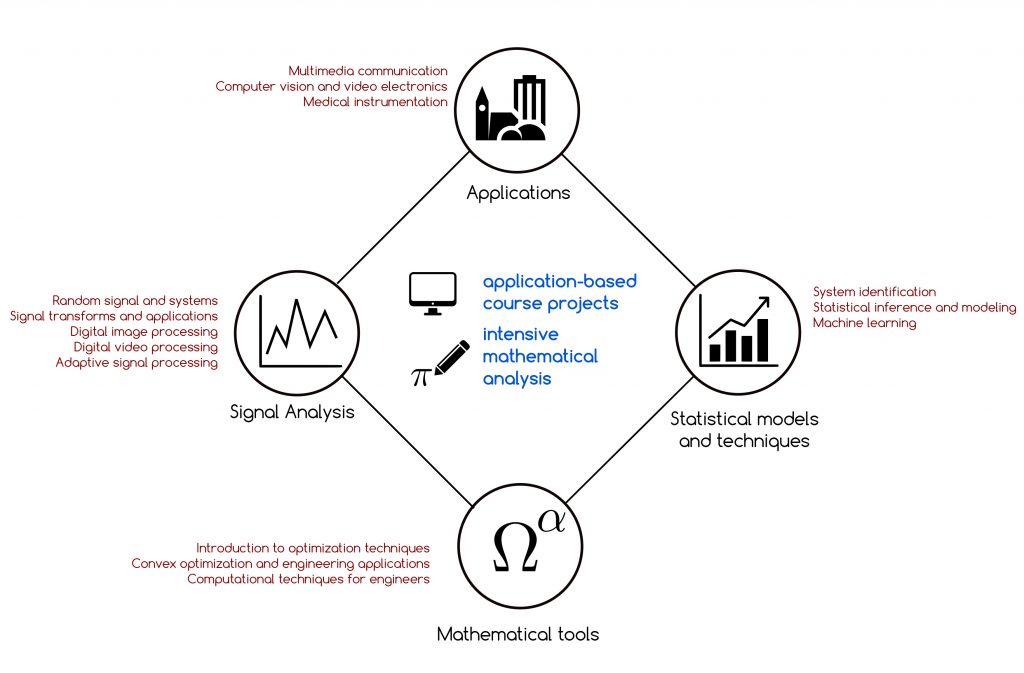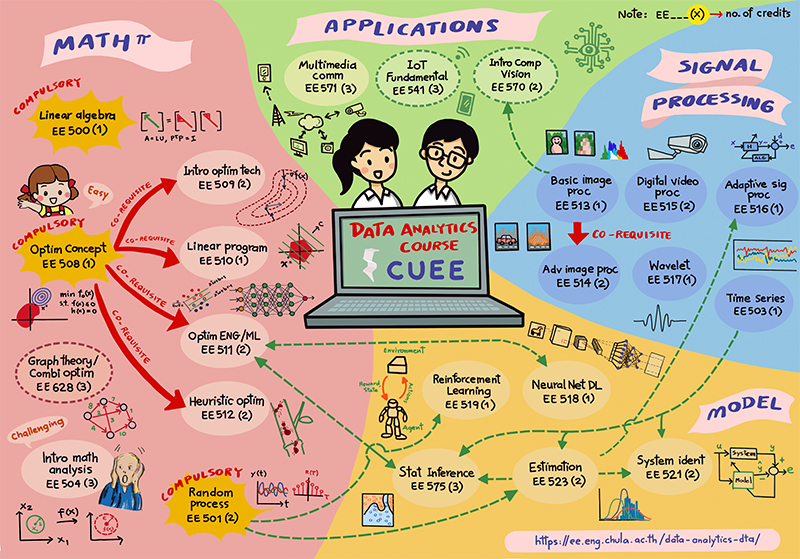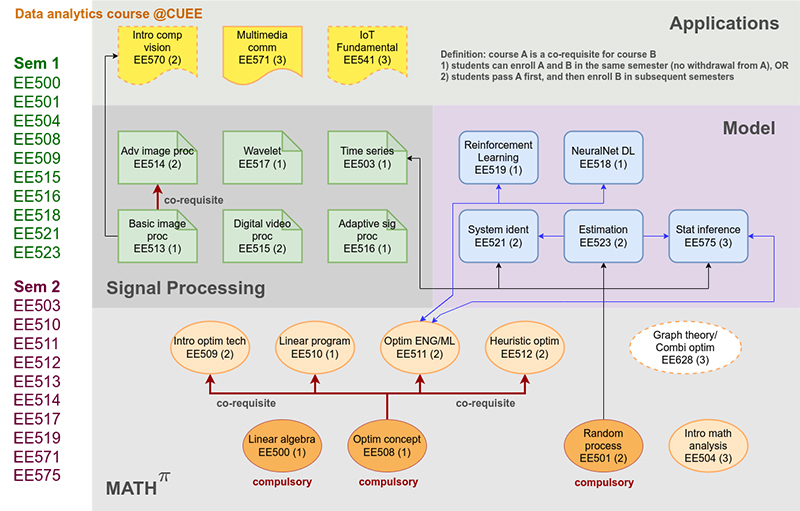
Overview
Data analytics is an interdisciplinary field that aims to draw meaningful insight underlying data using various techniques based on theories from many branches including mathematics, probability, statistics, optimization, and computer science. The techniques can be applied to various domains including Electrical Engineering, Biomedical Engineering, Financial Engineering, Agriculture, Transportation, Network Engineering and Atmospheric Sciences. Our graduate program in data analytics aims to introduce essential techniques and tools used for students who are upon successfully completing this program, to be able to
- Understand natural characteristics of data collected with the presence of randomness; clean up and manage the data appropriately using prior knowledge of the application domain of interest.
- Formulate quantitative models to address research or practical questions in engineering applications.
- Apply appropriate quantitative and statistical methods to make inference or prediction driven by data analysis.
- Provide critical evaluation of the statistical methods available in various domains.
- Communicate key knowledge and interpret information learned from the data to broad audiences.
Why studying Data Analytics at CUEE ?
- Various available courses across many disciplines. In addition to available courses by CUEE, Participants can also enroll in relevant courses from many other departments or faculties in Chulalongkorn university, ranging from mathematics, applied statistics, or computer science.
- Comprehensive foundation on mathematics and analysis. The key ingredient behind the success of statistical learning tools is from theories supporting statistical models and methods. We focus on developing analytical skills for participants to be able to construct predictive models and develop suitable statistical/numerical methods to the problem.
- Exposure to diverse engineering applications. Participants can explore research projects across various fields including renewable energy application, smart health technology, multimedia signal processing, embedded and control systems, and telecommunication and transportation networks. Students can conduct collaborative research with five Chulalongkorn research units (RUs) focusing on artificial intelligence, machine learning, smart grid technology, intelligent control, wireless network and future internet, smart light and lighting technology.

Research Highlights
Smart energy applications: solar power/solar irradiance/load forecasting using statistical methods and machine learning, home and building energy management, analysis of electrical energy yield of micro-inverter PV systems, estimation of transformer life-time using power quality data.
Smart health applications: Statistical models or analysis of biological time series (ECG, PPG, EEG, fMRI), Brain connectivity analysis, Causality analysis of physiological time series, QRS detection, Arrhythmia Detection, Atrial Fibrillation, Heart rate variability, Epileptic EEG seizure detection, Cuff-less Blood pressure estimation, Signal denoising in ultrasound and CT scans, white-blood-cell image classifications.
Traffic engineering applications: Reinforcement learning in road and telecommunication network applications, vehicular mobility classification, network traffic anomaly detection.
Speech enhancement: acoustic echo cancellation and background noise reduction in hands-free communications, noise reduction with dentist-drill applications, wavelet thresholding, signal decorrelation, and by adaptive filtering applications.
Image processing and recognition: face recognition, image segmentation, image classification, medical image processing, Hand-writing character recognition, Multi-focus image fusion for computer vision, Mosquito species classification, Dangerous object detection in X-ray.
Video processing and analytics: real time video processing in Single Board Computers/FPGA, video analytics in surveillance applications; face recognition, human action/gain recognition, image/video super resolution, anomaly detection in video scenes.
Sparse representation techniques: Signal/Image denoising, Wavelet applications, Sparse estimation using regularizations, sparse optimization.
Deep learning techniques: video coding and analytics, predictive maintenance for generator air cooler, music genre classification, lane/object detection, grid lock prediction in urban road network,

Available Courses
| 2102500* | (1 Credits) | |
| 2102501* | (2 Credits) | |
| 2102503* | (1 Credits) | |
| 2102504 | (3 Credits) | |
| 2102508* | (1 Credits) | |
| 2102509* | (2 Credits) | |
| 2102510* | (1 Credits) | |
| 2102511* | (2 Credits) | |
| 2102512* | (2 Credits) | |
| 2102513* | (1 Credits) | |
| 2102514* | (2 Credits) | |
| 2102515* | (2 Credits) | |
| 2102516* | (1 Credits) | |
| 2102517* | (1 Credits) | |
| 2102518* | (1 Credits) | |
| 2102519* | (1 Credits) | |
| 2102521* | (2 Credits) | |
| 2102523* | (2 Credits) | |
| 2102571 | (3 Credits) | |
| 2102575 | (3 Credits) |
Cluster Coordinator

Data Analytics (DTA)
Supavadee Aramvith
Supavadee.A@chula.ac.th

Data Analytics (DTA)
Jitkomut Songsiri
Jitkomut.s@chula.ac.th
| Professor in the Cluster | Research Interests |
| David Banjerdpongchai [DBP] | Industrial Automation, Advanced process control, Convex optimization, Robust control design, Control Application to Flexible Robot Arm, Distillation Column, Boiler, HVAC System; Energy management system, Energy Efficiency, Load and RE Forecast |
| Thavatchai Tayjasanant [TTN] | Power Quality Analysis, Power Quality Impacts of Distributed Generations and Smart Grid, Power quality data analytics, Smart Road Lighting, Horticultural Lighting, Human Centric Lighting, Intelligent lighting control |
| Naebboon Hoonchareon [NHC] | Power System Dynamics and Control, Energy Management Systems in Smart Grid, Solar Forecast and Applications |
| Nisachon Tangsangiumvisai [NTS] | Speech Enhancement, Noise Reduction, Adaptive Filtering, Acoustic Echo Cancellation, Wavelet Thresholding, Signal Decorrelation |
| Supavadee Aramvith [SAV] | Computer vision and deep learning techniques for surveillance applications, Image and Video Super Resolution, Video Anomaly Detection, Video Coding and Transmissions, Implementation of computer vision and deep learning model on SoC and FPGA. |
| Chaodit Aswakul [CAK] | Reinforcement Learning in Road and Telecommunication Network Applications, Vehicular Mobility Classification, Network Traffic Anomaly Detection, Machine Learning in Building Energy Management System Data and Mobile Telecommunication Network Data with Differential Privacy Protection, Network Security by Software-Defined Networking, Traffic Engineering Optimisation in Wireless Mesh Network, Network Function Virtualisation in Container Orchestration Cloud |
| Supatana Auethavekiat [SAK] | Medical image processing and recognition, image segmentation, image classification |
| Wanchalerm Pora [WPR] | Smart Devices, Smart Grid, Renewable Energy, EMS, AI, Weather Forecast, Mosquito Species Image Classification, Dangerous Object Detection in X-ray images |
| Charnchai Pluempitiwiriyawej [CPW] | Image Processing, Medical Image Segmentation (CT Scan, MRI), 3D image Reconstruction and Modeling, Face Recognition, White blood cell image classification, Gait recognition. |
| Chaiyachet Saivichit [CSC] | Communication Networking, Intelligent methods for Comm Networking, Graph Theoretical Networking, Telecom Economics, Network Reliability, Survivability and Trustworthiness |
| Jitkomut Songsiri [JSS] | system modelling, statistical learning, non-smooth optimization, sparse system identification, sparse optimization, solar power forecasting, brain connectivity, Granger causality, causality learning in time series |
| Widhyakorn Asdornwised [WAS] | 5G and Beyonds, 5G Private Networks, Signal Processing for Communications, Staistical Inference and Deep Learning, Sparse Representation, Digital Signal Processing, and Image Processing |
| Manop Wongsaisuwan [MWS] | Control Systems Theory, Robotics, Computer Application in Control Engineering, Machine Learning |
| Suree Pumrin [SPR] | Image processing, Computer Vision, Embedded Systems, Microscopy Image, Plant Phenotyping |
| Apiwat Lek-uthai [ALT] | Medical & Physiological Signal Processing |
| Teerapol Silawan [TSL] | Graph network and its applications, Combinatorial optimization, Metaheuristic and heuristic optimization (Swarm intelligence, Evolutionary algorithm, search based optimization, etc.) |
| Suwichaya Suwanwimolkul [SSK] | Computer Vision, Visual Localization, Solar Power Forecasting |
